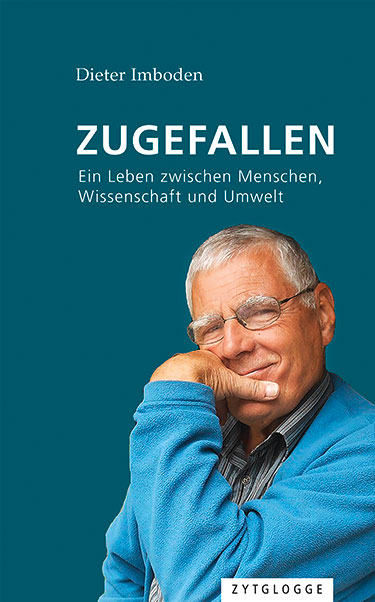The memoirs of Dieter Imboden.
Dieter Imboden, an environmental researcher and political scientist who spent much of his childhood in Basel, is a past winner of the Alumni Award. He recently published his autobiography.
The 2017 Alumni Award winner Dieter Imboden has just published his memoirs in book form. Becoming a renowned environmental researcher and political scientist was not the result of a carefully laid plan, but when the opportunities arose, he seized them. “Life is largely a matter of chance,” he writes early in the book, “but that does not absolve us of the responsibility to mold chance into opportunity.”
Studies in Berlin, Basel and Zurich
Born in 1943 in Zurich, he tells the story of little Dieter, growing up in a family of seven in Küsnacht, who discovers a passion for the railway and ponders which gods gave people their identity. When his father, the constitutional and administrative law expert Max Imboden, took a position at the University of Basel, the ten-year-old had his first experience of being different and having to integrate in the city’s St. Alban district. Shortly before turning 19, at a time when academic mobility was still a foreign concept, he began a degree in physics in a Berlin recently divided by the wall.
Later, he returned to Basel, where in spite of his own ineptitude on the dance floor he won the heart of a dancer – his future wife Sybil – and completed his degree. Academically, Imboden always followed his own path: “I can clearly remember when, toward the end of my doctorate, I told my colleagues I was giving up theoretical physics to study lakes. What about physics, what about academic rigor, they asked, certain that this decision would scupper my academic career forever.”
Letting go and saying goodbye
It didn’t turn out that way. Convinced of the importance of interdisciplinary research and undeterred by pushback from the established disciplines, the limnologist and a handful of colleagues founded the new degree program in environmental sciences at ETH Zurich. Their visionary concept made ETH one of the world’s leading universities for interdisciplinary environmental studies and research. Imboden became a professor of environmental physics, and went on to head the new department. From 2005 to 2012, he played a part in shaping research policy in Switzerland as President of the Swiss National Science Foundation (SNSF) research council. Imboden recounts all of this openly and self-critically, with no trace of vanity. He also writes of his time at the head of the “2000-watt society” project in the ETH Domain, a position he relinquished after two years as he felt that the idea was ahead of its time, and that his efforts were being blocked by disputes among the institutions.
Work isn’t everything, however: The reader also learns how Imboden and his wife succeeded in reconciling their careers with family life, raising two children in an era before nurseries and day schools. Or how the couple and their dog navigated the rivers and canals of Europe for years in their own boat. Finally, the book is about letting go and saying goodbye to friends. Imboden describes the importance of realizing that “more and more goodbyes will be forever, even though we can – fortunately – never know which.” A profound and humorous book that encourages the reader to embrace their own transience, and marvel at how much can be packed into just one life.
More articles in the current issue of UNI NOVA.

